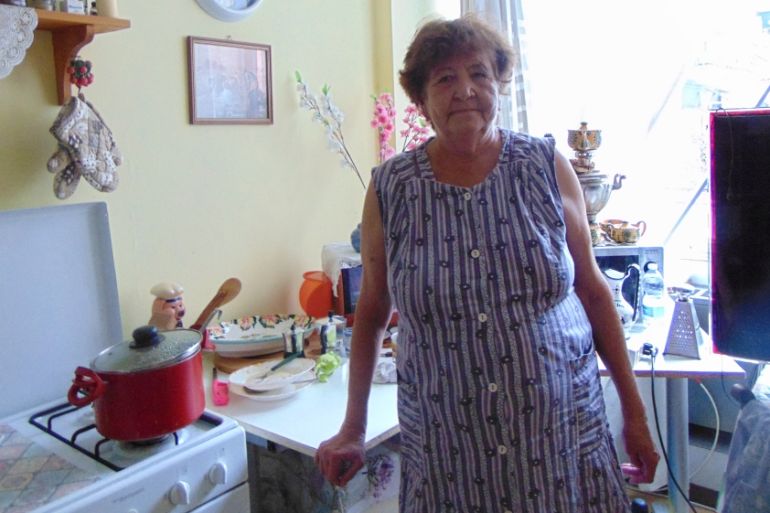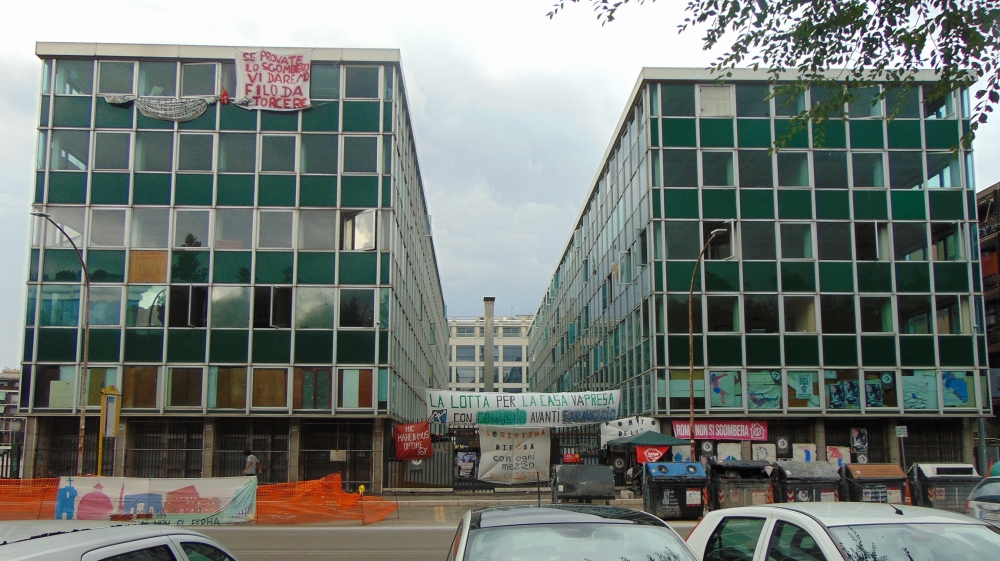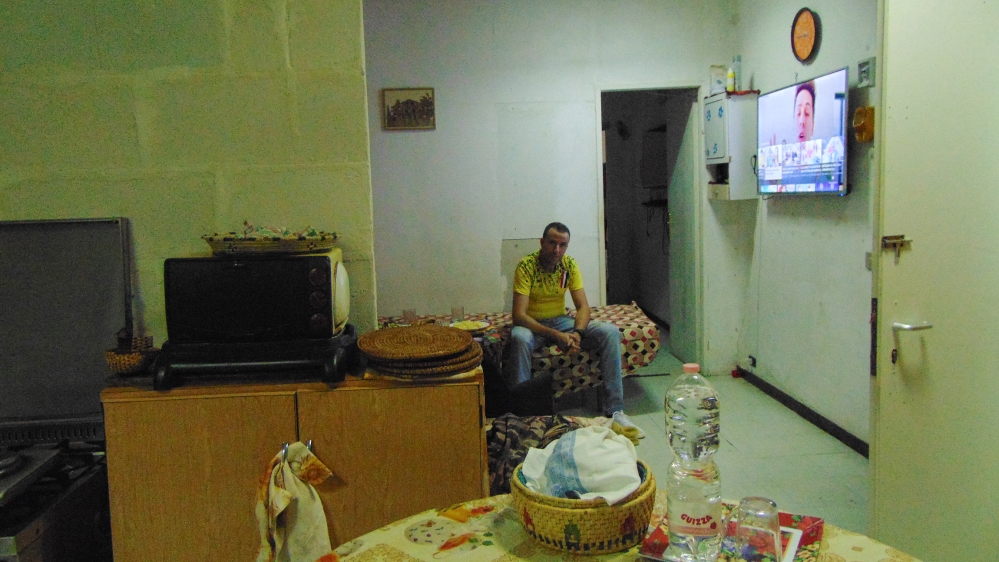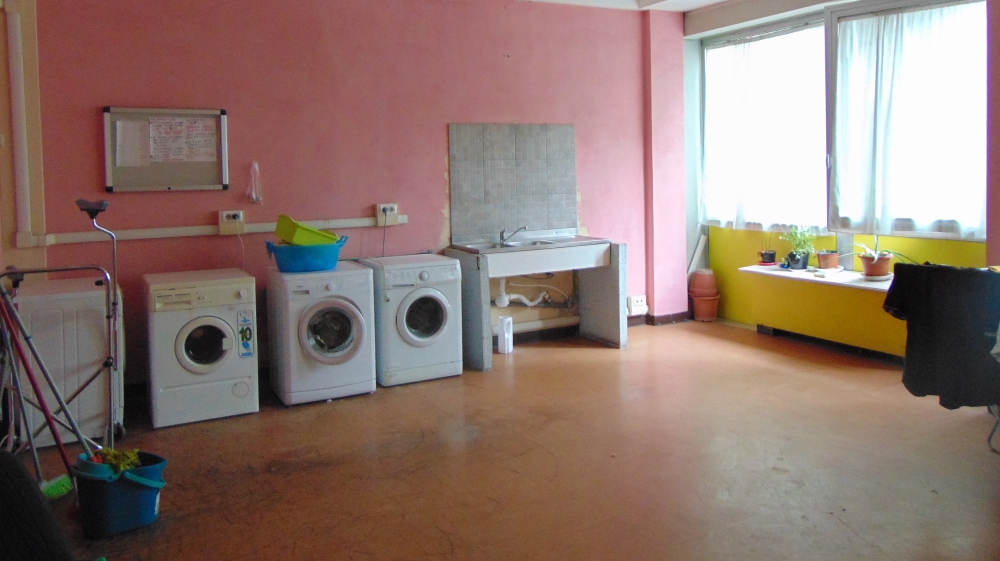Amid crackdown, eviction fears haunt long-term squatters in Rome
As hundreds fear homelessness, analysts say high number of squats in Rome shows failure to provide adequate housing.

Rome, Italy – Natalia Dzyuba, a 63-year-old immigrant from Ukraine with glaucoma and heart arrhythmia, has nowhere to go.
She has been living in Rome since 2002, but could soon be homeless.
“My passport has expired, I’m sick and if there’s a war in my country, where could I possibly go?”
The small pension she receives from Russia, as a former employee of the Soviet Union bureaucracy, is not enough to cover a monthly rental sum.
So she squats in a building in Viale del Caravaggio, a street in the city’s southern outskirts, together with her partner Casimir, a Polish man who works as a mover.
There are 380 other squatters – both immigrants and Italian citizens, among them 80 children – in the former office building.
Most work but remain poor – they have jobs, but do not earn enough to afford Rome’s rental costs. A one-bedroom in the suburbs is at least $750, and more than $1,000 in the city centre.
“We are a big family, all the children are calling me ‘grandma’,” said Natalia.

For the past few months, the residents have been living under the threat of eviction, fearing a police raid.
Warnings from the authorities are part of a wider housing emergency in the Italian capital.
Soaring property prices and a faltering public housing system, with 10,000 people currently waiting to be assigned a subsidised apartment, many low-income Romans are falling behind on their rent.
As many as 5,000 have resorted to occupying some of the city’s many empty buildings.
According to reports, authorities attempt to carry out eight evictions a day on average.
The occupation of the Viale del Caravaggio building, a former glass and concrete public office, began in 2013, organised by a grassroots housing rights group called “Coordinamento Cittadino di Lotta per la Casa“, or Housing Fight Committee.
The organisation helps families to squat empty facilities, arguing that it is unethical to keep buildings empty while many are homeless.

The Viale del Caravaggio squat is owned by the Armellini family, a real estate dynasty that was formally charged with tax evasion – they settled an out of court agreement, and had been empty for several years.
“There are 110 occupied buildings in Rome,” said Enrico Puccini, an architect who authored a book on housing policies. “It’s is the only capital of a G7 nation where that number is so high.”
He said that the root of the squatting movement lies with Roman authorities, which have failed to provide an alternative for poor families.
To curb the housing shortage, the city would need to provide 1,500 subsidised apartments each year, Puccini estimated.
Currently, only 500 subsidised apartments are assigned each year.
Since the building was conceived as an office facility, residents creatively adapted the spaces to accommodate family life, but some of the workplace look remains.
On each floor – there are five in total – a long, windowless corridor carpeted in linoleum runs between two wings of offices, now turned into small apartments.
Families with children are assigned a three-room flat, couples get two rooms and singles are assigned a studio.
There is no running water in the apartments, although they have an electric kitchen, so bathrooms, showers and laundry rooms are communal.

There is also a children’s room and an office for community meetings.
“We meet periodically, see if there are problems between us and discuss how we can solve them. We decide how to manage common areas and organise demonstrations for the right to the house,” said Anna Sabatini, an Italian pensioner who has lived there since 2013.
It is a vibrant, cohesive community.
When Sabatini, one of the Committee’s most respected members, passes by, everyone greets her and wants to chat.
Miriam, a 24-year-old, said this community spirit has been a great source of support.
“My husband died and I miscarried,” she said. “I don’t know how I would have done if the other squatters hadn’t been there. Living here is like being in a campsite we are people of all nationalities.”
This could all end soon, however.
Last year, in September, far-right Matteo Salvini, then interior minister, issued an order to evict all of Italy’s occupied buildings.
Local authorities in Rome have been slow to carry out Salvini’s order, but violence has been reported in some cases.
This year in July, a massive police operation successfully evicted the residents of an occupied building, a former school, in via Cardinal Capranica, in northern Rome.
Helicopters, water cannon, 120 officers and dozens of armoured vehicles were deployed against the 300 residents, whose attempts to resist proved useless.
We are not criminal. I really want to be legal, but where would I find the money to live?
The squatters of Viale del Caravaggio fear they could soon suffer the same.
Sabatini, who has met authorities on her community’s behalf, says they are planning to carry out the eviction by October 30.
Authorities threatened the eviction in September, but a political crisis slowed down the process.
As they wait in the thick of uncertainty, acts of support from the local community go some way in calming the residents’ nerves.
The parish priest of a nearby church recently visited to express his solidarity. Teachers from a local primary school, attended by many of the building’s children, signed a petition against the eviction.
A famous historian, Alessandro Portelli of La Sapienza college, held a public lecture in the building to draw attention to their plight. The subject of the talk was Malcolm X.
“We will resist,” said Sabatini.
Lorena, a single mother who cannot afford regular rent on her income as a waitress, said: “We are not criminal.
“I really want to be legal, but where would I find the money to live?”